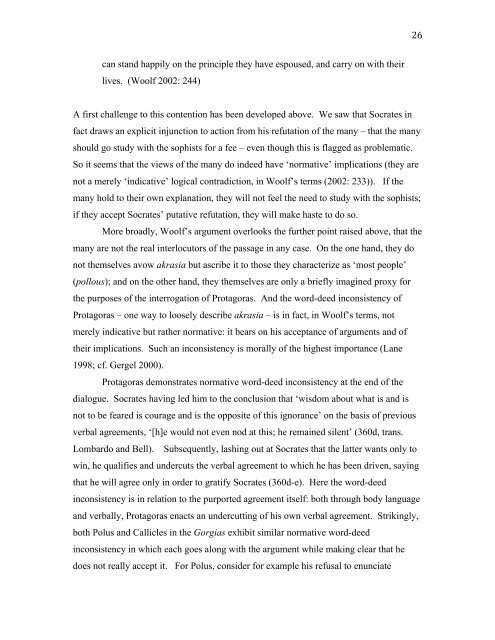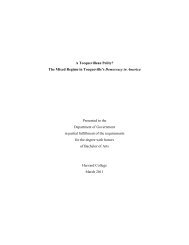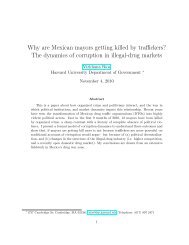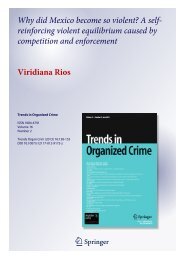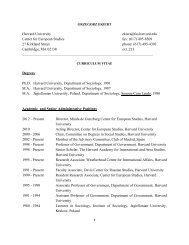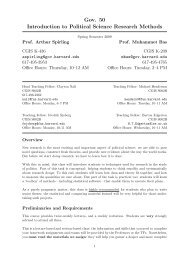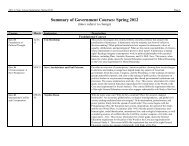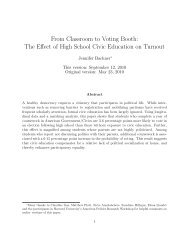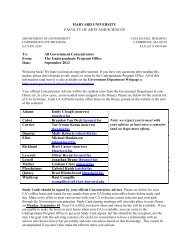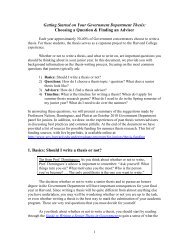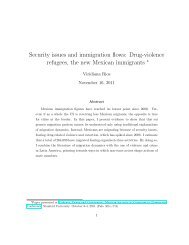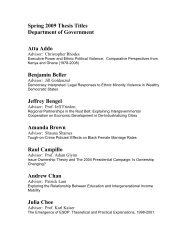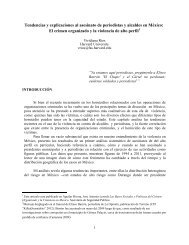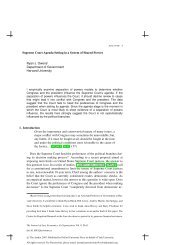1 Harvard University Political Theory Colloquium For 11 March 2010 ...
1 Harvard University Political Theory Colloquium For 11 March 2010 ...
1 Harvard University Political Theory Colloquium For 11 March 2010 ...
You also want an ePaper? Increase the reach of your titles
YUMPU automatically turns print PDFs into web optimized ePapers that Google loves.
26 <br />
can stand happily on the principle they have espoused, and carry on with their<br />
lives. (Woolf 2002: 244)<br />
A first challenge to this contention has been developed above. We saw that Socrates in<br />
fact draws an explicit injunction to action from his refutation of the many – that the many<br />
should go study with the sophists for a fee – even though this is flagged as problematic.<br />
So it seems that the views of the many do indeed have ‘normative’ implications (they are<br />
not a merely ‘indicative’ logical contradiction, in Woolf’s terms (2002: 233)). If the<br />
many hold to their own explanation, they will not feel the need to study with the sophists;<br />
if they accept Socrates’ putative refutation, they will make haste to do so.<br />
More broadly, Woolf’s argument overlooks the further point raised above, that the<br />
many are not the real interlocutors of the passage in any case. On the one hand, they do<br />
not themselves avow akrasia but ascribe it to those they characterize as ‘most people’<br />
(pollous); and on the other hand, they themselves are only a briefly imagined proxy for<br />
the purposes of the interrogation of Protagoras. And the word-deed inconsistency of<br />
Protagoras – one way to loosely describe akrasia – is in fact, in Woolf’s terms, not<br />
merely indicative but rather normative: it bears on his acceptance of arguments and of<br />
their implications. Such an inconsistency is morally of the highest importance (Lane<br />
1998; cf. Gergel 2000).<br />
Protagoras demonstrates normative word-deed inconsistency at the end of the<br />
dialogue. Socrates having led him to the conclusion that ‘wisdom about what is and is<br />
not to be feared is courage and is the opposite of this ignorance’ on the basis of previous<br />
verbal agreements, ‘[h]e would not even nod at this; he remained silent’ (360d, trans.<br />
Lombardo and Bell). Subsequently, lashing out at Socrates that the latter wants only to<br />
win, he qualifies and undercuts the verbal agreement to which he has been driven, saying<br />
that he will agree only in order to gratify Socrates (360d-e). Here the word-deed<br />
inconsistency is in relation to the purported agreement itself: both through body language<br />
and verbally, Protagoras enacts an undercutting of his own verbal agreement. Strikingly,<br />
both Polus and Callicles in the Gorgias exhibit similar normative word-deed<br />
inconsistency in which each goes along with the argument while making clear that he<br />
does not really accept it. <strong>For</strong> Polus, consider for example his refusal to enunciate


